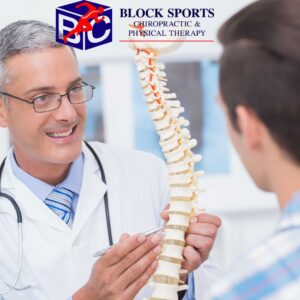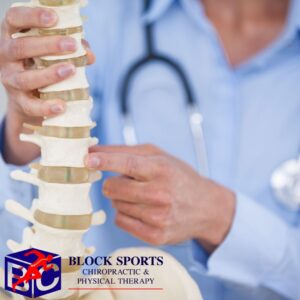
The health of your spine is our team’s top priority at Block Chiropractic & Sports Physical Therapy. Your spine health is essential because it harmonizes with your overall health and wellness. Every cell in your body is run by your central nervous system, and if your spine is not working properly, then, unfortunately, various issues can occur. The importance of spine health is significant. Here’s what you should do to help keep your spine healthy:
- Receive adjustments regularly: They will help to improve spinal motion and improve your body’s physical function as a whole.
- Exercise & stretch daily: Strengthening your core muscles and doing stretches to warm your body up before any exercise is key. Aerobics, extension stretches, and flexion stretches are recommended.
- Maintain a healthy weight: Being overweight can put your back at risk for problems placing added stress on the muscles, ligaments, and tendons in your back.
- Get a good nights sleep with the appropriate form: Another huge issue with back pain is the way people sleep. Laying on your back while sleeping puts approximately 50 pounds of weight on your back. The American Chiropractic Association recommends sleeping on your side or using pillows to elevate your knees to avoid more pain from occurring.
- Watch your posture: Your posture has a lot to do with your spine health. Look at the way you are sitting and standing. Are your knees slightly bent and are your shoulders back? Is your head leveled correctly? If your posture is good, your vertebrae will be correctly aligned.
- Maintain good form when lifting: Knowing the right lifting techniques is vital to prevent damage to your spine. Use your legs and knees rather than your back. If the object is heavy, don’t be afraid to ask for help.
If you have pain in your back or neck and feel as if you aren’t doing enough to keep your spine healthy, seeing our team of experienced chiropractors may be the right choice! Contact us today at Block Chiropractic & Sports Physical Therapy to experience how we can help you with your pain and get you on the right track towards optimal health.
Understanding the Anatomy and Importance of Spine Health
The Structure of the Spine
The human spine, also known as the vertebral column or backbone, is a remarkable structure made up of 33 individual bones called vertebrae, stacked one on top of the other. These vertebrae are divided into five main regions:
-
Cervical spine (neck): 7 vertebrae (C1–C7)
-
Thoracic spine (upper/mid-back): 12 vertebrae (T1–T12)
-
Lumbar spine (lower back): 5 vertebrae (L1–L5)
-
Sacrum: 5 fused vertebrae (S1–S5)
-
Coccyx (tailbone): 4 fused vertebrae
The upper 24 vertebrae are separated by intervertebral discs, which act as shock absorbers and allow for movement. The sacrum and coccyx are fused and provide stability at the base of the spine.
Key Components of Each Vertebra
-
Vertebral Body: The large, weight-bearing portion at the front of each vertebra.
-
Vertebral Arch: Forms the back part of the vertebra, creating a protective canal for the spinal cord.
-
Spinous and Transverse Processes: Bony projections that serve as attachment points for muscles and ligaments.
-
Facet Joints: Allow for flexibility and movement between each vertebra.
-
Intervertebral Discs: Cushions between vertebrae, consisting of a jelly-like center (nucleus) and a tough outer ring (annulus).
-
Foramen: Openings between vertebrae through which nerves exit the spinal cord to reach the rest of the body.
The Role of the Spine in Your Health
The spine does much more than just support your body. It:
-
Protects the spinal cord and nerves: The vertebral canal safely houses the spinal cord, which is the main pathway for messages between your brain and body.
-
Supports movement and flexibility: The design of the spine allows you to bend, twist, and move in many directions.
-
Bears the weight of the body: The vertebral bodies, especially in the lower back, are built to support your body’s weight and absorb stress from movement.
-
Connects to muscles and ligaments: These attachments help you maintain posture and balance, and allow for coordinated movement.
Why Spine Health Matters
A healthy spine is essential for:
-
Mobility and independence: Everyday activities like walking, lifting, and even sitting rely on a healthy spine.
-
Nervous system function: The spine protects the spinal cord, which controls sensation, movement, and organ function throughout your body.
-
Quality of life: Poor spine health can lead to pain, restricted movement, and even impact other body systems.
Common Spine Problems
Some of the most common spine-related conditions include:
-
Herniated discs: When the soft center of a disc pushes through its tough exterior, it can press on nerves and cause pain.
-
Sciatica: Pain that radiates along the sciatic nerve, often caused by a herniated disc.
-
Scoliosis: An abnormal curvature of the spine.
-
Spinal stenosis: Narrowing of the spinal canal, which can compress the spinal cord or nerves.
 Tips for Maintaining a Healthy Spine
Tips for Maintaining a Healthy Spine
-
Practice good posture when sitting, standing, and sleeping.
-
Stay active with regular exercise, focusing on core strength and flexibility.
-
Use proper lifting techniques to avoid injury.
-
Set up an ergonomic workspace.
-
Listen to your body—seek professional help if you experience persistent back pain, numbness, or weakness.
When to Seek Help
If you experience any of the following, consult a healthcare provider:
-
Persistent or severe back pain
-
Numbness or tingling in your arms or legs
-
Weakness in your limbs
-
Loss of bladder or bowel control
Take the First Step Toward a Healthier Spine
Your spine is the foundation of your health and well-being—don’t wait until pain or discomfort holds you back. At Block Chiropractic & Sports Physical Therapy, our experienced team is dedicated to helping you achieve optimal spine health through personalized care, education, and proven therapies. Whether you’re looking to prevent problems, address pain, or simply improve your quality of life, we’re here to support you every step of the way. Contact us today to schedule your consultation or a complimentary posture assessment, and start your journey to a healthier, more active life!
